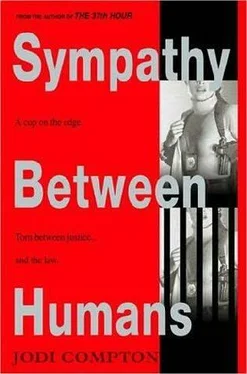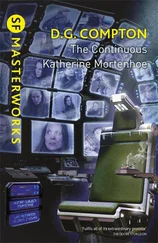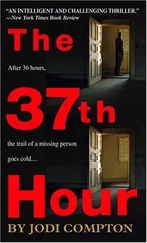“’S all right,” I told her.
In the end, Roz’s girlfriend, Amy, ended up taking a cab downtown in order to drive her home. Amy assured me it was no trouble to give me a lift, too. She didn’t recognize the address I gave her. But Roz did.
“You live in a housing project ?” she said, incredulous.
A loose-limbed teenage boyambled by in the hallway of the 26th floor of the north tower. His eyes met mine and flicked away; he went on to the apartment at the end of the hall. I was in front of 2605, where I’d knocked on the door, but gotten no answer. I tried again.
Then Cicero opened the door, wet-haired, a towel held half-crumpled in one hand. His shirt was damp where he’d obviously pulled it on hastily, without adequately drying the skin underneath.
“Is this a bad time?” I said.
“No, no,” he said. “Come on in.”
Inside, a smell of Ivory soap and steam had drifted into his living room. I said, “Sorry, I’m empty-handed tonight.”
“You don’t have to bring me anything to come over here,” Cicero said. “But am I right in guessing that while you didn’t bring a bottle this time, you haven’t been abstaining tonight? I thought I detected a semiliquid s in your-”
A knock on the door interrupted him. Cicero rolled to the door and opened it partway.
“I burned my arm,” a female voice said.
Cicero rolled back, and his patient entered. She was a thin white woman with lank brown hair, dressed in a disjointed ensemble of spaghetti-strapped satin camisole over sweatpants, and she held a wet paper towel to her arm.
“How’d this happen, Darlene?” Cicero asked.
“Cooking,” she said, and looked at me. But I saw her eyes, and knew from her pinpoint pupils that drugs were probably at the root of whatever kitchen accident she’d had.
Cicero turned to me. “Sarah, would you mind waiting in the other room?”
I nodded agreement and withdrew into his bedroom. If I knew him, this would take longer than just cleaning the burn and putting a topical salve on it; I doubted he’d missed her contracted pupils any more than I had, and he would probably follow treatment with advice on where to seek drug-dependency counseling.
The blinds of the window were up, as always, and the lights of Minneapolis lay below; I went over to look down. Cicero ’s voice and Darlene’s were faint through the bedroom door. Other than that, nothing. It was surprising how thick the walls of this building were. There were people around us, but I heard none of their activities. Other than hearing Fidelio bark once, my visits here had been like coming to someplace high atop a mountain. Normally, it was peaceful. Tonight, it was unnerving.
Roz had been a great distraction, as had the noise and crowd of the bar and the war stories we’d told each other. But now the question I’d been pushing from my mind came back to me, unappeased. What would happen if the BCA found Stewart’s blood in my car?
To be questioned as a primary suspect in Royce Stewart’s death had been painful. To see the distrust in the faces of some of my colleagues, and the perverse approval in the eyes of others- that had been distressing. But ultimately, I’d always had an escape clause where Shorty was concerned. I’d always known that if I were arrested or indicted, Genevieve would come back and tell the truth. I’d still be a conspirator in Shorty’s death, but not an accused murderer.
Now an unhappy possibility had arisen. Was it possible that Genevieve’s confession wouldn’t be enough? If all the physical evidence pointed to me, and so did all the witness testimony from Blue Earth, would a grand jury weigh Gen’s unlikely claim of guilt against the preponderance of evidence, and send me to trial instead? Once that happened, there would be very little to keep a jury from convicting me.
When I’d first been questioned by detectives from Faribault County, lying to protect Genevieve had seemed natural and right. Now I wondered if I hadn’t dug for myself a deeper hole than I’d ever realized.
The bedroom door opened, and I turned from the window.
“Hey,” Cicero said from the doorway, “sorry about that.”
“It’s your job,” I said.
“Are you hungry?”
I realized that I was. “How did you know that?”
“Med school,” Cicero said. “We’re taught to catch malnutrition early. What did you have for dinner?”
“Four whiskey sours, three beers, and half a basket of potato wedges,” I admitted.
“If there’s a more balanced meal than that, I haven’t heard of it,” Cicero said. “Let me make you some coffee and see what I’ve got in the way of food.”
I frowned. He was far from rich; I wasn’t even sure he was solvent. “You shouldn’t waste your food on me,” I said.
“Enjoy it and it won’t be a waste,” Cicero said.
He fixed me a tomato-and-avocado sandwich with a cup of coffee; we went back into his bedroom while I ate.
After I was mostly done, Cicero asked, “So, why were we drinking tonight?”
“Why is it that doctors always say we when they mean you ?” I asked him.
“It suggests empathy,” Cicero said. “You weren’t celebrating, were you?”
“No,” I said.
“What’s wrong?”
“Nothing, really.” I lifted the mug of coffee as if it would protect me from his curiosity.
“Like hell. What’s wrong?”
I licked a drop of tomato-stained mayonnaise from my finger. “That was a really good sandwich,” I said.
“Thank you. What’s wrong?”
I sighed. “It’s complicated,” I said. “It has to do with what my husband went to prison for, and… I just thought I was doing the right thing, and now I’m not so sure. Maybe you can understand that. What am I saying, of course you can.” I gave him a knowing look. “That’s how you lost your license, isn’t it? Assisted suicide. You helped a terminally ill patient to die, right?”
Cicero lifted an eyebrow. “How do you know that?”
“It wasn’t hard to figure out,” I said. “Compassion. It’s your fatal flaw.”
“Sexual misconduct,” he said.
“What?” I asked.
“I lost my license for sexual misconduct with a patient.”
“You’re joking,” I said.
“Sarah,” he reproved me, “why on earth would I make a joke about something like that?”
Chastised, I took refuge in my coffee once again. I drank, then spoke more carefully. “But it was a misunderstanding, right?” I said. “A false accusation?”
“No,” Cicero said. “It was sexual misconduct, period.”
I wanted to say, That’s not possible.
“She came into the ER one night on a suicide attempt,” Cicero said. “She was tiny, barely five feet tall, with waist-length blond hair. I could see that the suicide attempt was ambivalent. She’d cut her wrists, but only shallowly. I got her admitted to the crisis unit, and during the process, she told me her story.
“She was British, had come to New York at 16 to study ballet. There was a rift in her family: her mother was dead, and she didn’t talk much anymore to her father and sister. She’d wanted to start a new life in the States, but things didn’t go well. She’d started to struggle with her weight, which meant anorexia and amphetamines, and then alcohol and downers to cope with all the stress. She had a series of boyfriends, none of whom treated her well, and when her career evaporated, she’d married the worst of them, a man with a more serious drug problem than she had. She had two babies in quick succession, and quit drugs for her children’s sake, but her husband never did, nor was he faithful. One day she woke up and realized she was trapped in a strange city and a loveless marriage, with two small children and no viable skills. That was when she decided her kids would be better off without her.
Читать дальше












